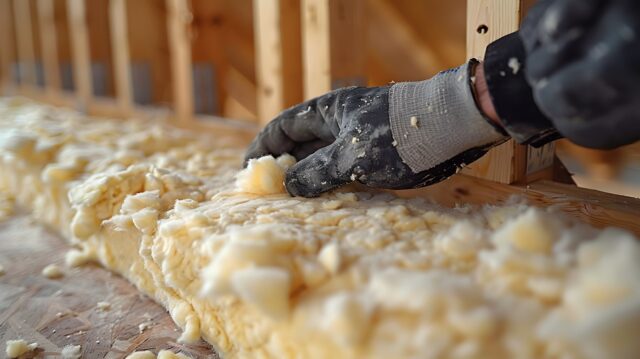Moisture can be a homeowner’s worst enemy, causing problems that range from structural damage to health issues. Excessive moisture in a home can lead to the growth of mold and mildew, which, once established, can spread rapidly and cause serious consequences. Fortunately, modern insulation solutions like spray foam insulation provide a robust defense against moisture infiltration. Jay Capodiferro, a leading expert in home insulation solutions, highlights the critical role that spray foam insulation plays in protecting homes from moisture, mold, and mildew.
Understanding the Threat of Moisture in Homes
Moisture can enter homes in a variety of ways, including leaks, poor ventilation, and humid climates. Inadequate insulation allows air to flow freely into and out of the home, carrying moisture with it. Once inside, moisture can condense on surfaces like walls, ceilings, and insulation materials, creating an environment where mold thrives. Mold spores are always present in the air, but they need moisture to grow. When they find a damp environment, they can quickly multiply, causing damage to building materials and posing health risks, particularly for those with respiratory issues or weakened immune systems.
Moisture problems are especially common in areas like basements, attics, and crawl spaces, where ventilation is often poor, and dampness is common. These areas are also notoriously difficult to insulate effectively with traditional materials, such as fiberglass or blown-in cellulose, which can leave gaps and deteriorate over time. Jay Capodiferro explains that this is where spray foam insulation makes a significant difference, providing a long-lasting and effective solution to moisture-related problems.
How Spray Foam Insulation Works as a Moisture Barrier
Spray foam insulation is applied as a liquid, which quickly expands and hardens, forming a continuous, airtight barrier. This expansion allows the foam to fill every crack, crevice, and gap, something traditional insulation materials often fail to do. This airtight seal prevents air and moisture from entering the home, effectively creating a protective envelope around the structure.
Jay Capodiferro explains that one of the primary advantages of spray foam insulation is its ability to act as both an insulator and a vapor barrier. Traditional insulation materials often need a separate vapor barrier to prevent moisture from seeping through, but spray foam insulation performs both functions simultaneously. This dual-purpose nature makes it an ideal choice for areas prone to moisture problems, such as basements, crawl spaces, and attics.
There are two main types of spray foam insulation: open-cell and closed-cell. Both types offer moisture control benefits, but they function differently.
- • Open-cell spray foam: This type of foam is more porous and lightweight. It allows some vapor to pass through, but it still creates an airtight seal that blocks air movement and reduces moisture condensation. While open-cell spray foam is less expensive than closed-cell foam, it may not provide as much moisture protection in highly humid or wet environments.
• Closed-cell spray foam: This type is denser and more rigid. It creates a completely impermeable barrier to both air and water vapor, making it an excellent choice for areas where moisture control is crucial. Closed-cell spray foam is ideal for use in basements, crawl spaces, and other areas that are more vulnerable to moisture infiltration.
Jay Capodiferro emphasizes that closed-cell spray foam is particularly effective in preventing moisture from entering a home. Its dense structure not only blocks air movement but also stops water vapor from passing through the walls, floors, and ceilings. This barrier effect helps to keep indoor spaces dry, even in environments with high humidity levels.
The Connection Between Moisture Control and Mold Prevention
Mold is one of the most common problems associated with excess moisture in the home. Mold spores need only three things to grow: moisture, organic material to feed on (such as wood, drywall, or insulation), and a dark environment. When these conditions are met, mold can develop in as little as 24 to 48 hours. Once established, mold is difficult to remove and can spread to other areas of the home through the air.
The health risks associated with mold are well-documented. Mold exposure can cause respiratory problems, allergic reactions, and other health issues, particularly for individuals with asthma or compromised immune systems. Jay Capodiferro points out that mold remediation can be costly, time-consuming, and often requires the replacement of damaged building materials. Therefore, preventing mold growth is far more cost-effective than dealing with it after the fact.
By acting as a moisture barrier, spray foam insulation reduces the likelihood of mold growth in areas where moisture tends to accumulate. The airtight seal created by the foam prevents the kind of air leakage that allows moisture to enter, while its water-resistant properties ensure that condensation does not form on walls or ceilings. This is especially important in places like attics, basements, and crawl spaces, where mold growth is most likely to occur.
Additional Benefits of Spray Foam Insulation Beyond Moisture Control
While moisture control and mold prevention are two of the most significant benefits of spray foam insulation, they are not the only reasons why homeowners should consider this material. Jay Capodiferro highlights several additional benefits:
- Energy Efficiency: Spray foam insulation provides excellent thermal resistance, reducing the amount of energy required to heat or cool a home. By creating a continuous seal, it minimizes air leaks, which are a major source of energy loss in most homes. This can lead to significant savings on energy bills over time.
- Soundproofing: Spray foam’s dense, airtight structure also provides soundproofing benefits. By blocking the movement of air, it reduces the transmission of sound between rooms and from outside the home. This makes it an ideal choice for homeowners looking to create a quieter indoor environment.
- Structural Support: Closed-cell spray foam insulation adds rigidity to walls and ceilings, which can enhance the structural integrity of a home. This is particularly beneficial in areas prone to severe weather, where extra reinforcement can help protect against damage.
- Longevity: Unlike traditional insulation materials, which can settle, sag, or deteriorate over time, spray foam retains its shape and effectiveness for decades. Jay Capodiferro notes that this long-lasting solution not only provides consistent moisture protection but also reduces the need for frequent insulation replacements.
Jay Capodiferro’s Recommendations for Homeowners
Jay Capodiferro advises homeowners to consider spray foam insulation as a long-term investment in their home’s health and durability. While the initial cost of spray foam insulation may be higher than that of traditional insulation materials, its superior moisture control, mold prevention, and energy efficiency make it a cost-effective solution in the long run.
By choosing the right type of spray foam for their specific needs and ensuring professional installation, homeowners can protect their homes from the damaging effects of moisture while enjoying the many other benefits that spray foam insulation has to offer.
Moisture control is essential for maintaining a healthy, safe, and energy-efficient home. Jay Capodiferro emphasizes that spray foam insulation offers homeowners a powerful solution to the problems caused by excess moisture, mold, and mildew. Its ability to create an airtight, moisture-resistant barrier makes it a valuable tool for preventing mold growth and ensuring long-term protection for homes in a wide range of environments. As homeowners increasingly look for ways to protect their investments, spray foam insulation stands out as one of the best solutions available.










